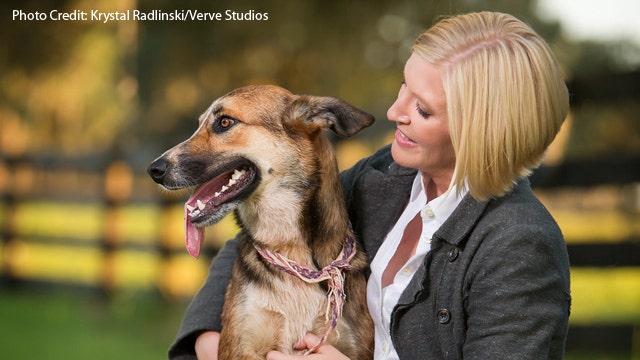What animals taught veterinarian about coping with cancer
In her book “Lucky Dog: How Being a Veterinarian Saved My Life” Sarah Boston describes what her patients taught her about coping with cancer and the Canadian health care system
Sarah Boston credits the age-old bond between animals and humans with helping her to beat cancer. So much so, that she authored the book “Lucky Dog: How Being a Veterinarian Saved My Life.” She told FoxNews.com that her work in treating animals battling life-threatening cancers not only taught her about coping with deadly diseases, but also shaped her beliefs on how a health care system should run.
In 2011, the Canadian veterinary cancer surgeon discovered a growing mass in her neck. When doctors said she would have to wait a week and a half for an ultrasound, she decided to take matters into her own hands and gave herself the procedure. Boston discovered what she believed to be thyroid cancer, but it would be more than two months before she saw a doctor who could confirm the diagnosis.
“I thought, ‘Well, I'll just go into my doctor and probably have surgery in the next week or so to get this out,’” she said, pulling from her experience in working with sick animals. “If I see a dog with thyroid cancer, they'll come in and usually have surgery within one or two days,” she said. However, Boston would soon find that in Canada's health care system, it's drastically different for human patients.
“It took two and a half months for me to go from finding a mass in my neck, to having surgery, and then another month for me to get my diagnosis,” she said.
The experience of anxiously waiting to be seen a doctor became emblematic of Boston’s entire ordeal.
While she was frustrated with the delays she experienced during her cancer battle, Boston said she is both proud of and credits Canada’s health care system with providing the high-quality of care that she received.
In her book, Boston offered two main pieces of advice to people who are navigating their way through the health care system while trying to cope with a deadly disease.
First, Boston advises her readers to “listen to yourself.” While many doctors were telling her to wait to see what becomes of her tumor, Boston knew from her professional experience that she should press for quick action. Boston tells her readers that if your gut is telling you something is wrong you should believe it, and shouldn’t be afraid to contact your doctor to push for better care.
Since battling a deadly disease is often overwhelming and draining, Boston’s second piece of advice is to “have an advocate,” or a friend or family member to help push for the best care possible.
“Having someone there to take notes, and ask questions, and help you is really important,” she said. An advocate also gives the patient space to focus on and deal with the fight they have ahead of them.
Boston also said that she has learned many mechanisms of coping from her work with animals, specifically in how to live after receiving a devastating diagnosis.
“I can have a family in a room, that are all crying because their dog has cancer, and the dog's walking around wagging its tail,” Boston said. She said witnessing this has led to her understand that death is inevitable, and that like animals who are unaware of their diagnosis, we must “find a way to find joy in your life.”









































